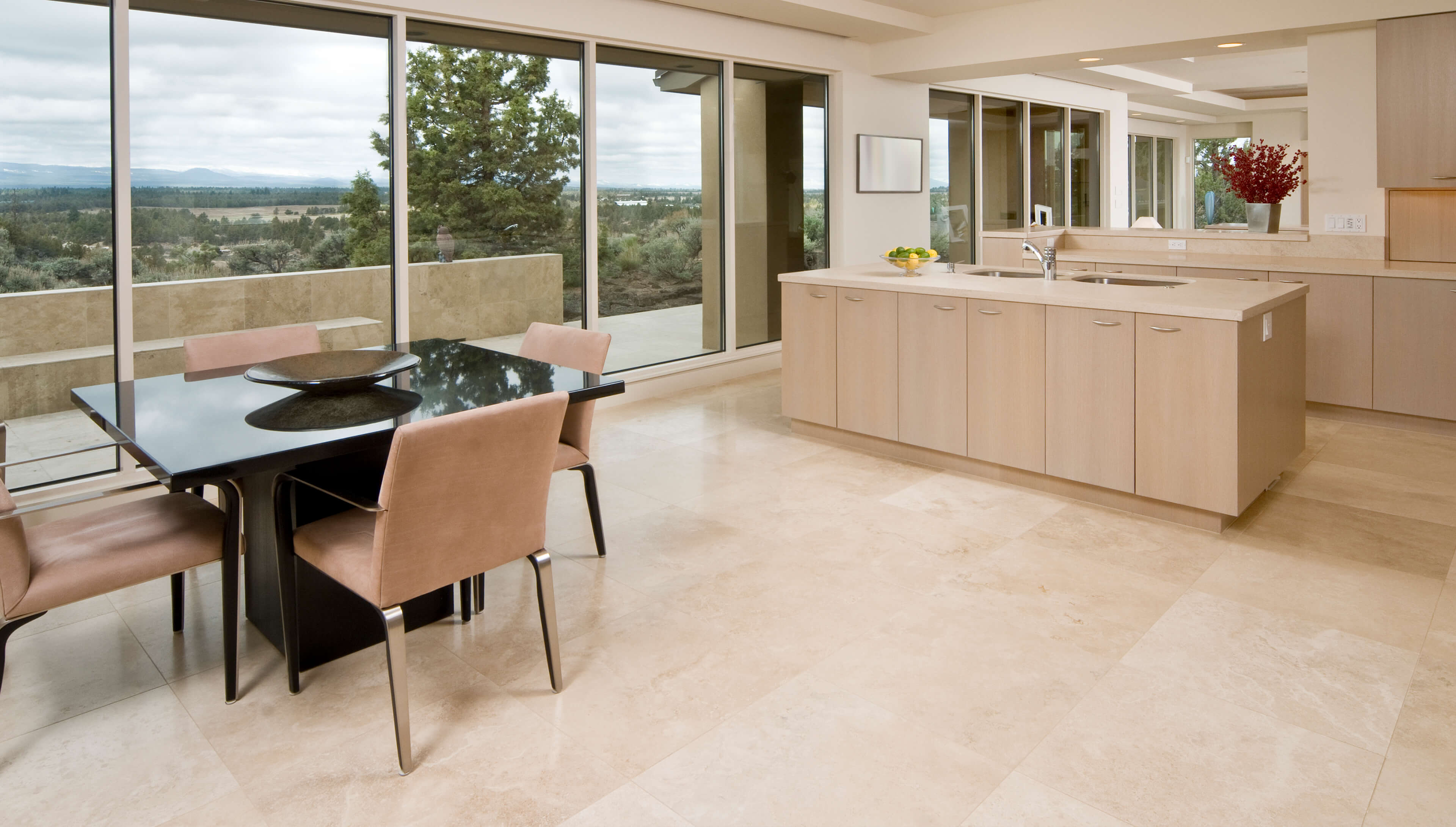The aroma of freshly baked bread, the clatter of dishes, the occasional spill – the kitchen is the heart of any home, a space filled with both warmth and chaos. As you embark on a kitchen renovation, flooring choice becomes a crucial decision. Laminate flooring, with its affordability and durability, has become a popular contender. But the question lingers – can it truly withstand the rigors of kitchen life?

Image: flooringstype.com
In the past, laminate flooring was often viewed as an unsuitable option for high-traffic areas like kitchens. However, advancements in technology have significantly improved its water resistance and durability, making it a viable alternative to traditional flooring options.
Understanding the Pros and Cons of Laminate Flooring in Kitchens
Laminate flooring boasts several advantages that make it a tempting choice for kitchens. It’s highly durable, resistant to scratches and dents, making it ideal for withstanding the inevitable wear and tear of everyday use. Its affordability provides a budget-friendly option compared to natural materials like hardwood or tile. Plus, laminate flooring comes in a wide range of styles and colors, allowing you to tailor your kitchen’s aesthetic to your preferences.
However, it’s essential to acknowledge the potential drawbacks. Laminate flooring isn’t as water-resistant as tile, requiring careful maintenance to prevent water damage. Additionally, while some brands boast “waterproof” qualities, prolonged exposure to water can lead to warping and damage. Its synthetic nature also means it lacks the natural warmth of hardwood and the luxurious feel of stone.
Evaluating the Suitability of Laminate Flooring
The decision of whether laminate flooring is suitable for your kitchen hinges on your specific needs and preferences. If you prioritize durability, affordability, and a wide range of design options, laminate flooring can be a great choice. However, if you have young children or are prone to spills, the risk of water damage might make you opt for a more water-resistant alternative.
Choosing the Right Laminate Flooring for Your Kitchen
If you decide to go with laminate flooring, selecting the right type becomes crucial. Look for flooring with a high-density core, which makes it more resistant to water absorption. Consider the wear layer thickness, as thicker wear layers offer greater protection against scratches and scuffs. Most importantly, choose a laminate flooring specifically designed for high-traffic areas and marketed as “water-resistant” or even “waterproof”, providing extra assurance against spills.
Proper installation is also key to ensuring the longevity of your laminate flooring. Consult with a professional installer who can ensure the flooring is laid properly and sealed to prevent water ingress.

Image: phenergandm.com
Recent Trends and Innovations in Laminate Flooring
The laminate flooring industry has been undergoing a rapid evolution, with manufacturers continuously seeking to improve its functionality and aesthetics. Several innovative technologies are emerging, such as “click-lock” installation systems for faster and easier installation, and “scratch-resistant” finishes that offer enhanced durability.
Moreover, the industry is embracing the demand for more realistic and aesthetically pleasing designs. You can now find laminate flooring that mimics the look and feel of natural materials like wood, tile, and even stone, offering unparalleled versatility for your kitchen design.
Expert Tips for Using Laminate Flooring in Kitchens:
1. **Choose a high-quality, water-resistant laminate flooring:** Opt for flooring specifically designed for kitchens and marketed as “waterproof” or “water-resistant”.
2. **Proper installation is key:** Hire a professional installer who understands the specific requirements for kitchen installations.
3. **Use area rugs:** Strategically place area rugs in high-traffic zones or spill-prone areas to provide additional protection.
4. **Clean spills immediately:** Timely cleanup is essential to prevent water damage. Use a damp cloth and mild detergent to wipe up spills and ensure the flooring dries completely.
5. **Regular maintenance:** Regular sweeping, vacuuming, and mopping with a damp cloth will help extend the life of your laminate flooring.
FAQ – Laminate Flooring in Kitchens:
Q: Is laminate flooring waterproof?
While some brands boast “waterproof” laminate flooring, it’s important to remember that no laminate flooring is entirely waterproof. Prolonged exposure to water can still lead to damage. Choose high-quality, water-resistant flooring and ensure appropriate installation techniques for maximum protection.
Q: What are the best laminate flooring brands for kitchens?
Several reputable manufacturers produce high-quality, water-resistant laminate flooring options for kitchens, including Pergo, CoreLife, and Shaw. Research different brands, compare their features, and read customer reviews to find the best fit for your needs.
Q: How long does laminate flooring last in a kitchen?
With proper installation and maintenance, laminate flooring can last for 15-20 years in a kitchen. However, the lifespan can vary depending on the quality of flooring, foot traffic levels, and how well it’s maintained.
Q: How do I clean laminate flooring in the kitchen?
Regular sweeping or vacuuming is recommended to remove dust and debris. For spills, use a damp cloth and mild detergent to clean and dry the area thoroughly. Avoid harsh chemicals or abrasive cleaners, as they can damage the flooring’s finish.
Can Laminate Flooring Be Used In Kitchens
Conclusion
Laminate flooring, with its affordability, durability, and wide range of design options, has proven to be a viable flooring option for kitchens. While it may not be completely waterproof, choosing a high-quality, water-resistant laminate flooring and employing proper installation and maintenance techniques can significantly minimize the risk of water damage. When considering your kitchen renovation, weigh the pros and cons of laminate flooring against your needs and preferences to make an informed decision.
Are you considering laminate flooring for your kitchen? Share your thoughts and questions in the comments below!






